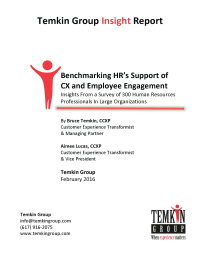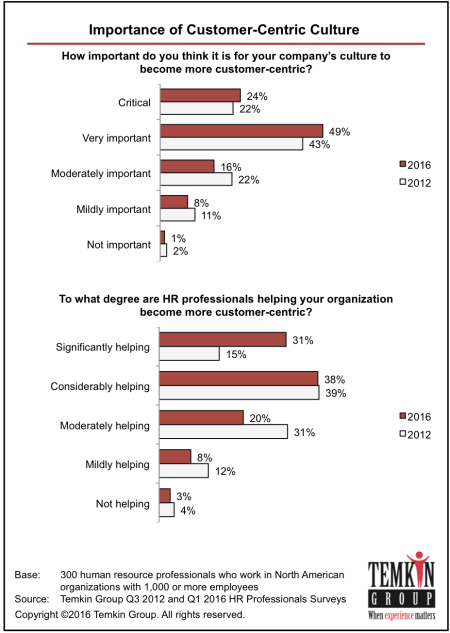Report: Benchmarking HR’s Support of CX and Employee Engagement
February 10, 2016 Leave a comment
 We published a Temkin Group report, Benchmarking HR’s Support of CX and Employee Engagement. We surveyed 300 HR professionals from large organizations in North America and compared the results to a similar study we did in 2012. Here’s the executive summary:
We published a Temkin Group report, Benchmarking HR’s Support of CX and Employee Engagement. We surveyed 300 HR professionals from large organizations in North America and compared the results to a similar study we did in 2012. Here’s the executive summary:
Employee engagement is a critical component of customer experience (CX). To determine how effectively human resource (HR) departments support these engagement efforts, we surveyed 300 HR professionals from large companies and compared the results to a similar study we conducted in 2012. Seventy-three percent of HR professionals believe that it’s very important for their organization to become more customer-centric, but only 31% believe that HR professionals are significantly helping these efforts. The good news? That’s more than twice the level of HR support we found in 2012. Compared with 2012, companies are both measuring and acting on employee feedback more frequently, and HR professionals have more bandwidth to work on employee engagement. When we compared the companies that deliver outstanding customer experience with the companies that don’t, we found that the CX leaders have better financial performance, enjoy higher levels of engaged employees, are more customer- and mission-centric, have HR groups that are more actively involved in CX and employee engagement activities, and more frequently measure employee feedback. To improve employee engagement, companies must master the Five I’s of Employee Engagement: Inform, Inspire, Instruct, Involve and Incent.
Here’s one of the 25 figures in the report:
Here are some other findings in the research:
- In the 2016 study, 80% of HR professionals stated that employee engagement is an important area of focus for their organization, a significant increase from 75% in 2012. During that same time period, the HR professionals who give their organizations at least a “good” rating on for employee engagement efforts has grown from 61% to 73%.
- HR organizations that are significantly helping their organizations become more customer-centric has more than doubled from 15% in 2012 to 31% in 2016.
- HR organizations that are considerably involved in their company’s customer experience efforts has grown from 52% in 2012 to 60% in 2016. The top obstacle keeping HR professionals from helping their organizations from becoming more customer-centric was the same in both 2012 and 2016: “HR leadership has not defined it as a priority for HR.”
- Companies that measure employee engagement more frequently than once per year grew from 27% in 2012 to 40% in 2016.
- Companies with significantly above average customer experience for their industry (CX Leaders) have HR professionals that more frequently collaborate with their CX peers. For instance, CX Leaders are almost twice as likely as other firms to share responsibility with CX groups for developing employee awards to support good customer-centric behaviors.
- 72% of executive teams in CX Leaders put a high priority on taking action on results from employee engagement studies, compared with 39% of other firms.
- The top obstacle to employee engagement efforts identified by HR professionals within CX Leaders is “limited funding,” while HR professionals at other firms point to “lack of a clear employee engagement strategy.”
